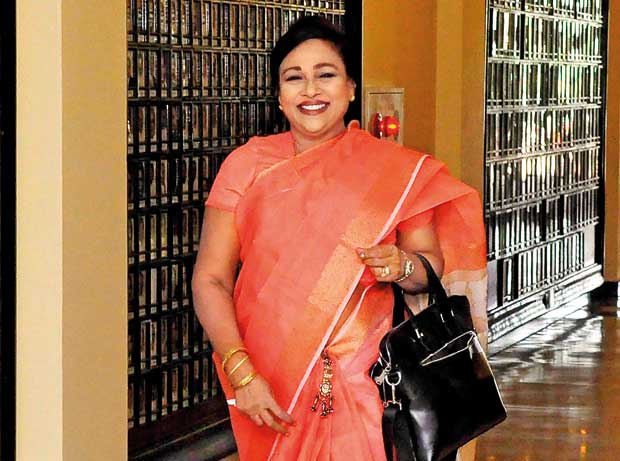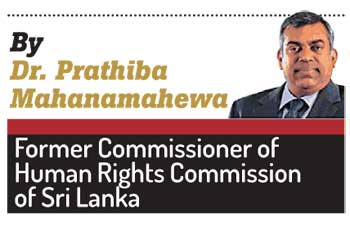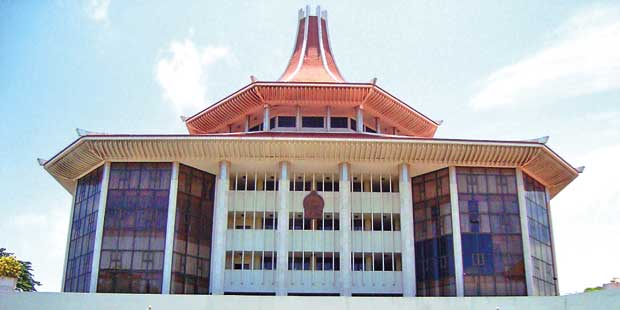Reply To:
Name - Reply Comment
Last Updated : 2024-04-19 19:28:00

If the Supreme Court endorses the same judgement delivered by the Court of Appeal, she can vacate her seat under Article 91(1)(d)(13) where a citizen of Sri Lanka who is also a citizen of any other country and 66 (G) of the Constitution that the seat of a Member shall become vacant if among other things, if his election as a member is declared void under the law in force for the time being; where he becomes subject to a disqualification under these Articles.
The main legal issues arising here are that her disqualification has not been challenged after one-hour of handing over the nominations or within one month after she has been elected as a Member of  Parliament. When contesting for Parliament elections the applicable law is Parliamentary Elections Act (No. 1 of 1981). According to Section 115 of the Act, which say that death, withdrawal or disqualification of such person or persons, the nomination paper of that party or group nomination paper shall not be invalidated and accordingly, the candidature or election of any other person nominated by the party or group is only invalidated. Therefore one argument is to appoint the next person who secured the most number of votes in that parliamentary election. But when you analyse the Constitutional provisions in the 1978 Constitution whereby a MP disqualified from his or her seat under Article 66(G) the relevant provision of law filling vacancy is clearly described in Article 99(13) of the Constitution.
Parliament. When contesting for Parliament elections the applicable law is Parliamentary Elections Act (No. 1 of 1981). According to Section 115 of the Act, which say that death, withdrawal or disqualification of such person or persons, the nomination paper of that party or group nomination paper shall not be invalidated and accordingly, the candidature or election of any other person nominated by the party or group is only invalidated. Therefore one argument is to appoint the next person who secured the most number of votes in that parliamentary election. But when you analyse the Constitutional provisions in the 1978 Constitution whereby a MP disqualified from his or her seat under Article 66(G) the relevant provision of law filling vacancy is clearly described in Article 99(13) of the Constitution.
Article 99(13) of the Constitution provides for the filling of vacancies in Parliament by nominating the candidate who received the next highest number of preferential votes on the relevant list, for vacancies created in the event of Members resigning from their parties or being expelled there from or any vacancies occurring in terms of Article 66. Article 66 of the Constitution provides for the ways in which a parliamentary seat may fall vacant. However, 66(g) - instances where the election of a sitting MP is declared void in terms of a law in force - is expressly exempt from the application of Article 99(13) of the Constitution. On this basis, what should happen in the event of Kumarasinghe being declared unqualified is the entire list of the UPFA being rejected. Neither the Constitution nor the Parliamentary elections Law says what should be done in instances falling under Article 66(g) - where the election of a sitting MP is declared void in terms of a law. Depending on the interpretation that the Supreme Court gives on this matter, things could be much messier than the government anticipates. Under the present Constitution, the ‘constituency’ or the ‘electorate’ that elects MPs to Parliament is the District, and there are no individual electorates as under the first past the post system.

As such Kumarasinghe is not the MP for Bentara-Elpitiya but for the Galle District. She was elected not as an individual nominated for that district but as a member of a list submitted by her party. The party secretary signs the entire nomination paper and not just the nomination paper of Kumarasinghe. If Geetha is disqualified from contesting elections to Parliament at the time she signed the nomination paper, the entire nomination list should be deemed to have failed. Therefore the final interpretation should be taken from the Supreme Court of Sri Lanka where filling the vacancy under Article 99(13) where MP becomes disqualified under prevailing law. The possibilities are cancellation of the full list of MPs of Galle District in such case other parties in the Parliament from that district are entitled to the UPFA seats, including the national list or call for by election for the same district. Therefore the Independent Election Commission has a duty not only to name the next candidate but to consider the Constitutional provisions of filling the vacancy.

Add comment
Comments will be edited (grammar, spelling and slang) and authorized at the discretion of Daily Mirror online. The website also has the right not to publish selected comments.
Reply To:
Name - Reply Comment
On March 26, a couple arriving from Thailand was arrested with 88 live animal
According to villagers from Naula-Moragolla out of 105 families 80 can afford
Is the situation in Sri Lanka so grim that locals harbour hope that they coul
A recent post on social media revealed that three purple-faced langurs near t